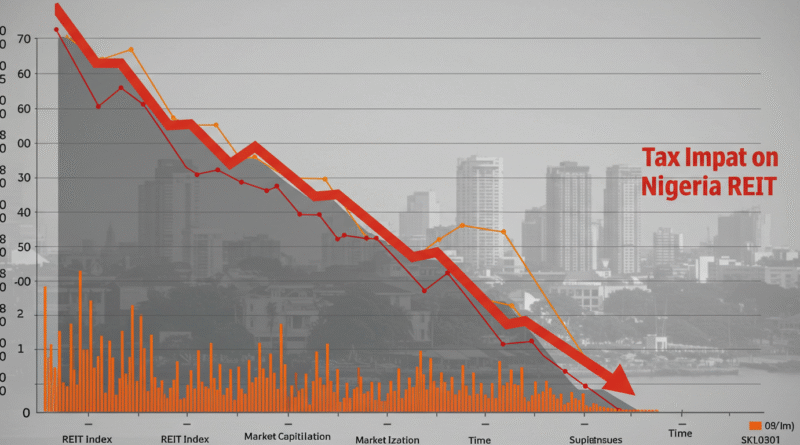Nigeria REITs Tax Reform: Can Policy Unlock Billions for Real Estate
Policies can make or cripple a nation’s economy. From the records, Real Estate Investment Trusts (REITs) have transformed housing markets across the world.
From the United States to South Africa, they have channelled billions into homes, offices, and infrastructure by pooling money from investors and deploying it in real estate. They make property investment accessible to ordinary people and create stable returns for institutions.
Yet in Nigeria, the story is different. Our REITs are still small, valued at just about 600 million dollars in 2024, a fraction of the trillions invested elsewhere. Why? The answer, many experts argue, lies in one stubborn obstacle: taxation.
Today, the conversation around REITs tax reform in Nigeria is gaining momentum. Advocates believe that removing double taxation and adopting a “pass-through” model could release billions of dollars into the economy. The potential impact stretches far beyond investors’ wallets. It could reshape the real estate market, boost housing supply, create jobs, and help Nigeria’s cities grow more sustainably.
Nigeria REITs Tax Reform: Why Double Taxation Keeps Investors Away
At its core, a REIT is supposed to make property investment easy and rewarding. Investors buy units in a REIT, just like shares, and earn dividends from rental income or capital gains. But in Nigeria, this promise is undercut by the tax structure.
Currently, REITs risk being taxed at two levels: first at the REIT itself, and then again when distributing income to investors. This is unlike global best practice, where many countries operate under a pass-through system, taxing income only once, at the investor’s level.
For investors, this difference is really huge. Imagine two similar REITs, one in Nigeria and one abroad. The Nigerian investor eventually ends up with thinner margins simply because the system eats into returns. Over time, this discourages participation, shrinks liquidity, and makes REITs less attractive compared to other investment vehicles.
What the reform advocates want is clear: adopt a true pass-through tax status. If income is taxed only at the investor level, REITs will become more competitive, transparent, and rewarding.
What Investors Stand to Gain
For Nigerian investors, tax reform is not a theoretical debate but a direct question of how much money ends up in their accounts. Local investors would be encouraged to place their savings into REITs, deepening the country’s financial markets. Diaspora Nigerians, who often hesitate to invest back home due to fear of fraud or weak structures, would have a more transparent and professional entry point into real estate. Institutional investors such as pension funds, insurance firms, and asset managers would also gain reliable, tax-efficient vehicles for their long-term funds.
The investor takeaway is simple: Nigeria’s REITs tax reform would turn REITs into a magnet for both local and foreign capital.
Could Nigeria REITs Tax Reform Spark a Housing Revolution?
Nigeria’s housing deficit is estimated at 28 million units. Every year, millions move into urban centres like Lagos, Abuja, Port Harcourt, and Enugu, pushing demand even higher. Government budgets alone cannot fill the gap. Private capital must play a role in sustainability.
If REITs are made more attractive through tax reform, the results could be transformative. More money flowing into REITs would give developers the resources to build large-scale housing estates, finance commercial centres, and invest in modern infrastructure. Affordable housing projects could finally move from drawing boards into reality. At the same time, the commercial real estate market, from office parks to warehouses, would benefit from a fresh injection of long-term capital.
Old and neglected estates in major cities could also be revitalized. With stronger REIT funding, developers would have both the incentive and the financial muscle to take on urban regeneration projects. And as new roads, airports, and rail lines open up across the country, REIT-backed housing developments could cluster around them, creating new growth corridors.
In effect, tax reform could unleash a housing revolution that addresses the deficit while also modernizing Nigerian cities.
The Wider Economic Impact
The conversation about tax reform is not only about investors and developers. It is about the economy at large. Real estate is one of the biggest multipliers in any economy. When capital flows into construction and property, several industries feel the impact. Cement factories work overtime, steel mills find new buyers, and logistics companies move more goods. Jobs are created not only for architects and engineers but also for artisans, transporters, and service workers.
Financial markets also stand to gain. A deepened REIT market would add both diversity and resilience to the Nigerian Exchange, making it more attractive to international investors. Government, too, would benefit. Even though immediate tax concessions may reduce revenue, the long-term gains in VAT, stamp duties, and personal income taxes from a more vibrant economy would more than compensate.
In a country battling unemployment, housing shortages, and foreign exchange pressures, this multiplier effect is too big to ignore.
Implications for the Real Estate Sector
The implications of Nigeria’s’s REITs tax reform for the property sector are profound. With easier access to capital, developers would no longer depend entirely on slow bank financing or unstable joint ventures. They could take on projects with more confidence, knowing that REITs provide a steady pipeline of funds.
This would also reshape the rental market. Lagos, for example, has some of the highest rent pressures in Africa due to undersupply. If more housing stock is created through REIT-backed projects, rent inflation could slow, offering relief to tenants. On the commercial side, the growth of e-commerce and logistics in Nigeria demands new warehouses and distribution hubs, a perfect match for long-term REIT funding.
At the same time, mixed-use developments, which combine residential, commercial, and leisure facilities, could expand in cities in Nigeria. These projects require patient capital, which REITs are designed to provide. The result would be more modern urban landscapes that reflect the needs of a growing middle class.
Why it Matters to You
For an ordinary Nigerian, tax reform may sound abstract, but its effects could be felt in daily life. More housing supply means a better chance of finding affordable rent in cities like Lagos and Abuja. For aspiring homeowners, REIT-backed affordable housing projects could make ownership more achievable. For small savers, a fairer system makes REITs a genuine alternative to simply keeping money in the bank. And for communities, stronger REITs mean more investment in neighborhood renewal, cleaner surroundings, and better infrastructure.
This is why the debate is not just for policymakers or financiers. It concerns anyone who pays rent, dreams of owning a home, or wants a safer way to invest.
Related News
Lagos property demolition crisis: Oworonshoki, Gaskiya, and looming threats to Makoko
Challenges and Unanswered Questions
Of course, reform is not automatic. Even if Nigeria adopts a pass-through system, other issues remain. Bureaucracy in land titles and approvals continues to slow projects. Inflation and currency volatility can erode returns, making investor protection even more urgent. Many Nigerians also lack awareness about REITs, limiting uptake. And unless regulators like the SEC, FIRS, and state agencies align, conflicting rules could still undermine growth.
Still, none of these challenges outweighs the opportunities reform can unlock.
Conclusion
Real estate is more than bricks and mortar. It is policy. And right now, Nigeria stands at a crossroads. The choice is whether to keep REITs small and stifled under double taxation or to unleash their potential by adopting a pass-through system.
For investors, the answer is obvious: better tax rules mean stronger returns and safer investments. And for developers, it means access to bigger pools of capital. For the economy, it means jobs, growth, and urban renewal. And for ordinary Nigerians, it means a chance at affordable housing and a fairer shot at wealth creation.
The lesson is clear. If Nigeria gets REITs right, the benefits will spread far beyond the property sector. A bold move on taxation could turn REITs into the engine that powers the country’s housing revolution and strengthens its economic future.

